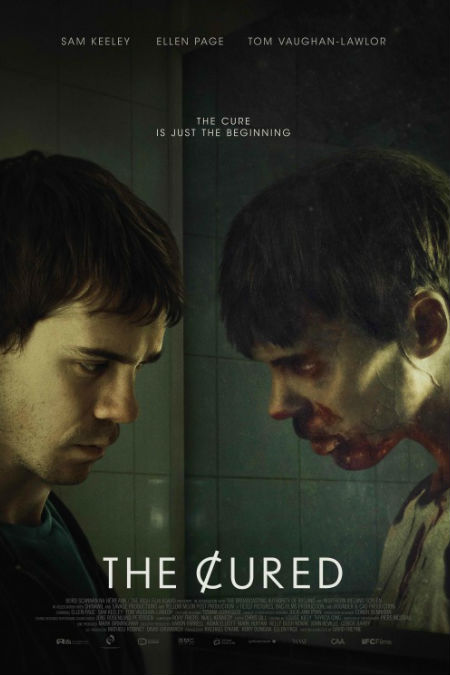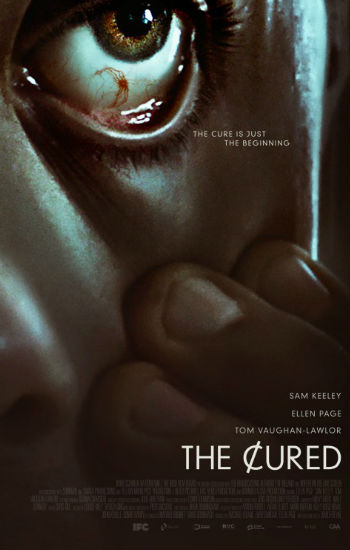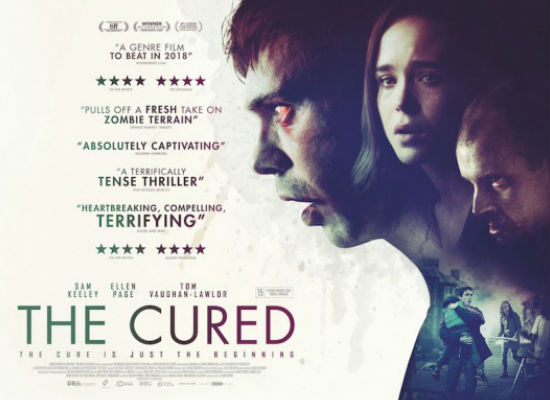
Life is a messily indistinct business.
While it would be lovely indeed if it divided itself neatly into clean cut before, during and afters, the unsettling reality is that one period often bleeds into the other, leaving us craving a neat fairytale transition but never really being delivered one.
This is the narratively-sage area occupied by The Cured, written and directed by David Freyne, which picks up its story after the Maze Virus, which transforms its victims into a raging, cannibilistic, zombie-like state, has swept through Europe, leaving Ireland in particular a country devastated, barely-recovered after four years of battling infected hordes.
Everything is, officially, at least, under control, with 75% of the infected responding to a cure (they are know, naturally enough, as the Cured) while 25%, locked away underground in cages, prove themselves resistant (the Resistant), a constant threat to the fragile new peace Ireland has made its virulent natural enemy.
The great debate is what to do with the Infected; the government wants to euthanise them all, drawing a firm bloody line under an horrific period in Irish history that has seen a significant chunk of the population either infected or eaten; however, it’s not that simple, with the more militant members of the Cured, treated to near-endless, often-violent discrimination, and Dr. Lyons (Paula Malcolmson), one of the two people responsible for the cure, unwilling to surrender to the seeming inevitable just yet.
It’s in this messy, well-argued over limbo, caused by a desire by both sides to have their incontrovertibly-clean ending (one which we know can’t, and won’t be forthcoming) that video journalist Abbie (Ellen Page) and her Cured brother-in-law, Senan (Sam Keeley) are reunited, both looking for some sort of redemptive fresh start after a society-trashing whirl through the undead vortex.

It’s not quite so simply alas, with Senan, like all of his fellow Cured, able to remember, with nightmarish vividness, everything he did while in the unrelentingly bloody grip of the Maze Virus.
Desperate to make a go of the fact that he has been given a chance many of his fellow Cured haven’t been – survivors are rife with fear and prejudice, unwilling to accept the once-infected back into their barely back-together midst so many stayed in a grungy, grimy dormitory where they plot revenge for their ill-treatment – Senan is troubled by his visions of consuming his brother Luke (Peter Campion) mere minutes after onetime barrister Conor (Tom Vaughan-Lawlor) bit and infected him.
Conor is the leader of the resistance to the discrimination the Cured receive on a continual basis, and keeps trying to rope in Senan who revels in his role as an uncle, keeping sensibly quiet about the his active role in Abbie’s stoic widowhood.
It’s a witches brew of a situation, one that pays no heed to any desire for an end to things, and as the divisions in society brew, fracture and explode, it becomes apparent, once again, that humanity may always wish for the very best of outcomes but very rarely delivers it to itself.
Ireland, despite its best efforts, is once dead careening to the undead abyss, with everyone forced to take sides just when they should, in theory, be getting their somewhat, very flawed, happily (sort of) ever after.
Subtle The Cured is not, but it brings something vital and new to the much-trod through zombie genre, asking us what comes after when the apocalypse has been mostly averted and society is struggling, like a drunken newborn calf, to its still shaky legs.
If resolve counts for anything, the After-Apocalypse should be on its merry way with an alacrity borne of a desperate, impelling need to fix what has been broken – the Infected euthanised, the Cured reintegrated into the world they once assiduously rent asunder, and the survivors picking up, if not where they left off, at least in a place where they can go about their normal lives unmolested, uneaten and uninfected.

But life is never that forgiving nor evenly delineated, and Abbie and Senan find themselves juggling a grim array of secrets, future hopes and burbling fears that never let either person rest or move on in any sort of convincing way.
Their struggle for a normal life proves resolutely elusive – Abbie tries to put her head down, do her job and take her son to and from school but there’s a yawning gulf between what she tries to conjure up and what she gets – a microcosm of the struggle that the Irish nation as a whole faces as it tries to rebuild what may be irreparably broken.
Quite how broken emerges slowly but surely in this thoughtful drama that largely eschews zombie chomping gore for considered reflection of what follows the descent into undead chaos until the final tension-fuelled climax that finds itself spent in a way that fits with the overall theme and feel of the film.
As an allegory for a society wrapped in dislocation and fractious dissent, The Cured is a masterclass, as visually grim as it is thematically brutally real, a study in what happens when a society surrenders to the worst of itself even as it tries to find the very best of itself in the mire.
The film also underscores how even in the midst of a ruinous situation that there are those who will choose their own ambition or exercise of power over the greater good (in other words, the true nature of someone outs whatever the circumstances), and how they’re able to get away with it; in contrast, we also see people who defy expectations, who genuflect to the better angels of theirs and humanity’s nature, to the betterment and safety of us all (even if they lose out in the process).
The Cured is that rare thing – a reasonably fresh take on the zombie apocalypse that explores what happens to people and a society when fear overtakes reason and compassion; it underlines too, in scenes equally terrifyingly grim and compassionately intimate, that if you treat people like monsters, they became monsters with the reverse being true, leaving society either damned or elevated as a result.